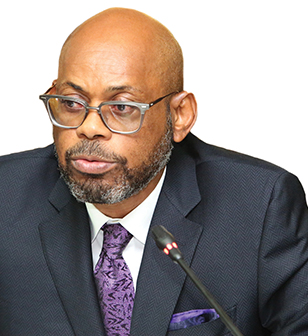Q: What are your medium-term reform priorities for the Angolan economy?
A: Our key priorities include ensuring the sustainability of public debt by achieving a debt profile of maturities and interest rates that is more in line with our real capacity to attract tax revenues. Another is to keep net international reserves at levels that guarantee our economic sovereignty and food security. We also plan, through the appropriate use of customs tariffs and other instruments, to stimulate domestic production of goods and services that we currently import. Other priorities include improving tax collection and reversing the budget deficits of recent years. Our Public Investment Plan focuses on transport infrastructure, roads, energy and water projects, as well as health, education and housing, with a view to improving the quality of public spending.
Another priority is to carefully monitor factors that could to lead to price increases, especially those that affect low-income families. We are also making a systematic and rigorous effort to repay a backlog of state and public sector debts to private companies. This effort, being made at a time when treasury funds are scarce, will enable the business community to make new investments and create jobs. These priorities are set out in our Interim Government Programme, Economic Stabilisation Programme and National Development Plan for 2018 to 2022 .
Q: What steps is the government taking to diversify the economy and reduce dependence on oil?
A: One of our most recent decisions is aimed at stimulating the domestic production of basic necessities. The Support Programme for Production, Export Diversification and Import Substitution, approved at the beginning of July, aims to halve imports of these goods and services by replacing them with domestic production and services in agriculture, livestock, fisheries, industry, health, training, education and other areas. Fiscal and foreign exchange incentives are being used to encourage this transition as well as specific international partnerships to help boost national production.
Q: What is the government doing to attract foreign investment and improve the business environment in Angola?
A: Government action across a range of sectors is focused on eliminating the contextual costs for investors, especially in the sectors previously mentioned that have great potential for substituting imports and generating exports. Legislation on public-private partnerships is at an advanced stage of preparation, a private investment law was recently enacted and the National Assembly is currently considering legislation on privatisation together with a competition law, which MPs of all parties approved unanimously.
Q: What specific measures is the government taking with regard to the banking sector, such as dealing with the shortage of foreign exchange?
A: The government has implemented a major plan for restructuring and recapitalising some of the most important banks. We have also strengthened equity requirements and tightened compliance practices. These measures have brought our financial system in line with the best practices in the world’s leading financial markets in the areas of [combating] money laundering and terrorism financing. The Angolan banking sector is also beginning to channel more credit to productive sectors of the economy. The shortage of foreign exchange is gradually being mitigated, especially by means of a new operational framework for the exchange market. This involves easing the exchange rate through the central bank’s auction system and the application of floating exchange rates. As a result, the gap between the exchange rate that banks are willing to use and the parallel exchange rate, which once stood at 100%, has fallen to 40%.
Q: How do you see the Angolan economy progressing in the next five years?
A: Angola will emerge this year from two consecutive years of negative growth. We have received very positive signals from the international markets, expressing confidence in the reforms we have undertaken and the ability of our economy to return to robust growth. One of the most recent signs was the placement of $3.5bn in Eurobonds, with maturities of 10 and 30 years. The National Development Plan envisages the economy growing at cruising speed of more than 4% a year.












